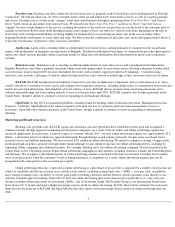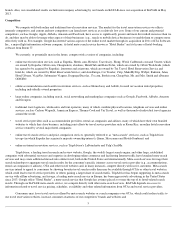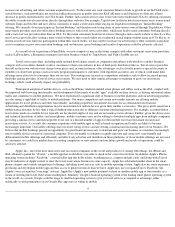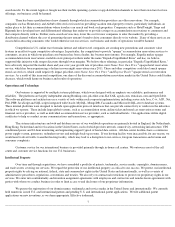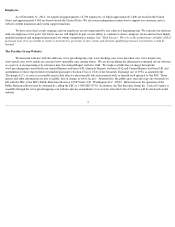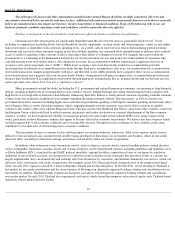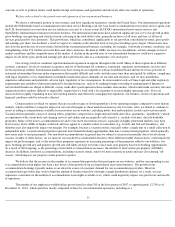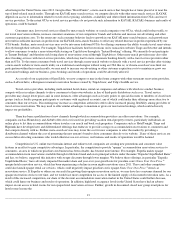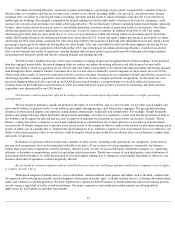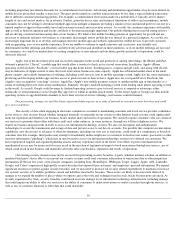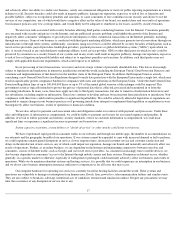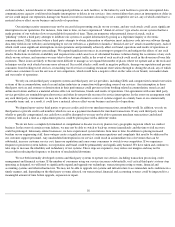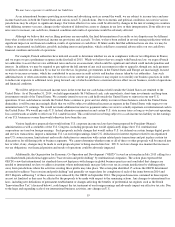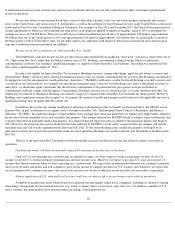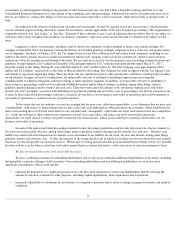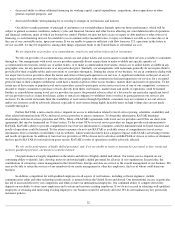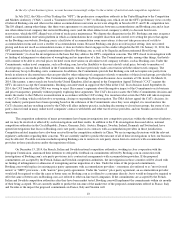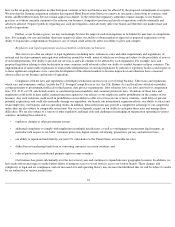Priceline 2014 Annual Report Download - page 18
Download and view the complete annual report
Please find page 18 of the 2014 Priceline annual report below. You can navigate through the pages in the report by either clicking on the pages listed below, or by using the keyword search tool below to find specific information within the annual report.
price difference for members of the closed user group between a retail hotel reservation and an opaque hotel reservation, which may lead to
fewer consumers using our opaque hotel reservation services.
In addition, after entering into an exclusive, long-term strategic marketing agreement in August 2013, Expedia acquired Travelocity in
January 2015. On February 12, 2015, Expedia announced that it had entered into an agreement to acquire Orbitz. To the extent these acquisitions
enhance Expedia's ability to compete with us, in particular in the United States, which is Expedia's, Travelocity's and Orbitz's largest market, our
market share and results of operations could be adversely affected.
We are exposed to fluctuations in currency exchange rates.
We conduct a substantial majority of our business outside the United States but we report our results in U.S. Dollars. As a result, we
face exposure to adverse movements in currency exchange rates as the financial results of our international business are translated from local
currency (principally the Euro and the British Pound Sterling) into U.S. Dollars. The U.S. Dollar significantly strengthened against the Euro
during 2014, moving from an exchange rate of 1.38 U.S. Dollars per Euro as of January 1, 2014 to 1.21 U.S. Dollars per Euro as of
December 31, 2014 . The U.S. Dollar also strengthened significantly during this time frame as compared to many other currencies. As a result,
our foreign currency denominated net assets, gross bookings, gross profit, operating expenses and net income have been negatively impacted as
expressed in U.S. Dollars. For example, gross profit from our international businesses grew year-over-year on a local currency basis by
approximately 32% for the three months ended December 31, 2014 , but, as a result of the impact of changes in currency exchange rates, grew
by 24.2% as reported in U.S. Dollars.
Certain European Union countries with high levels of sovereign debt have had difficulty at times refinancing their debt. Concern around
devaluation or abandonment of the Euro common currency, or that sovereign default risk may become more widespread and could include the
United States, has led to significant volatility in the exchange rate between the Euro, the British Pound Sterling, the U.S. Dollar and other
currencies. The European Central Bank, in an effort to stimulate the European economy, recently launched a quantitative easing program to
purchase public debt, which in turn has caused the Euro exchange rate to weaken compared to the U.S. Dollar.
Significant fluctuations in currency exchange rates can affect consumer travel behavior. For example, recent dramatic depreciation of
the Russian Ruble has resulted in it becoming more expensive for Russians to travel to Europe and most other non-Ruble destinations.
Consumers traveling from a country whose currency has weakened against other currencies may book lower ADR accommodations, choose to
shorten or cancel their international travel plans or choose to travel domestically rather than internationally, any of which could adversely affect
our gross bookings, revenues and results of operations, in particular when expressed in U.S. Dollars.
Additionally, foreign exchange rate fluctuations on transactions denominated in currencies other than the functional currency result in
gains and losses that are reflected in our financial results.
The volatility in foreign exchange rates and their impact on consumer behavior, which may differ across regions, makes it more
difficult to forecast industry and consumer trends and the timing and degree of their impact on our markets and business, which in turn could
adversely affect our ability to effectively manage our business and adversely affect our results of operations.
We rely on online advertising channels to enhance our brand awareness and to generate a significant amount of traffic to our websites.
We believe that maintaining and expanding the Booking.com, priceline.com, KAYAK, agoda.com, rentalcars.com and OpenTable
brands, along with our other owned brands, are important aspects of our efforts to attract and retain customers. Effective online advertising has
been an important factor in our growth, and we believe it will continue to be important to our future success. As our competitors spend
increasingly more on advertising, we are required to spend more in order to maintain our brand recognition and, in the case of online advertising,
to maintain and grow traffic to our websites. In addition, we have invested considerable money and resources in the establishment and
maintenance of our brands, and we will continue to invest resources in advertising, marketing and other brand building efforts to preserve and
enhance consumer awareness of our brands. We may not be able to successfully maintain or enhance consumer awareness and acceptance of our
brands, and, even if we are successful in our branding efforts, such efforts may not be cost-effective. If we are unable to maintain or enhance
consumer awareness and acceptance of our brands in a cost-effective manner, our business, market share and results of operations would be
materially adversely affected.
14


